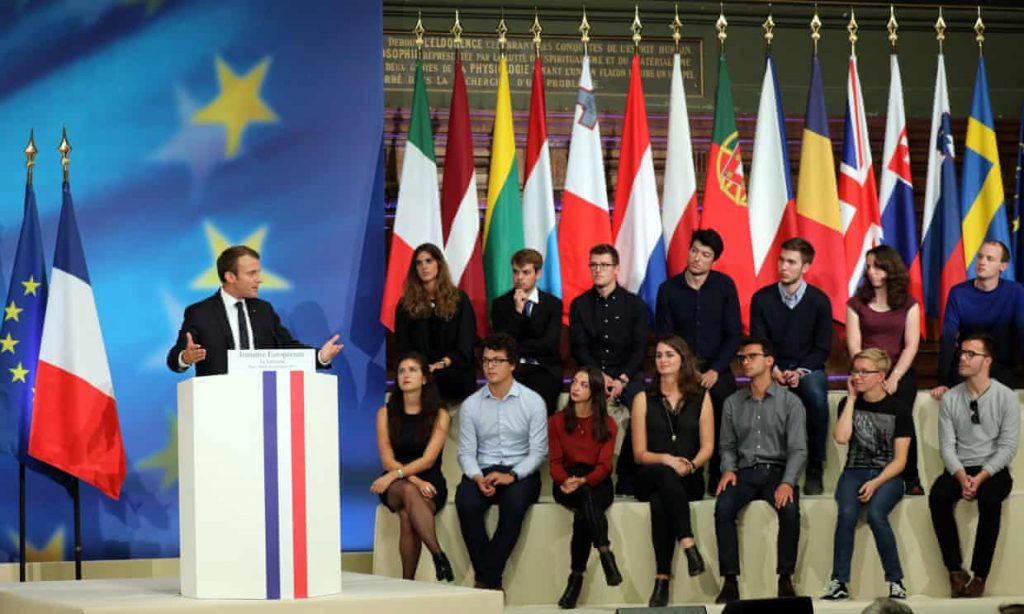Brexit, if it has to happen, could have a silver lining. It could be an opportunity to reform and refashion the European project by making good on the aspiration of an ever-closer political union, needed today more than ever before.
The Need for a Stronger Union

President Macron addressing the need for EU reform with deeper political integration 26 September 2017 at the Sorbonne in Paris. Photograph: Ludovic Marin/Reuters
Judging from my experience in the UN climate change negotiations, the EU can be a major international player and a force for good, but only if it ceases to ‘punch below its weight’ due to a lack of political union. This is why I fully concur with the view expressed by nine eminent progressive Europeans, including Christophe Castaner, president of La République En Marche!, and the European Parliament’s Brexit negotiator Guy Verhofstadt in a recent Op-Ed in the Guardian:
“Rather than accepting a divided and weakened continent at the mercy of the world’s other great powers, we are calling for a sovereign Europe capable of acting forcefully in areas where individual member states are powerless, in economic and monetary policy, security and defense, environment and agriculture, social policy, immigration and integration and digital change.”
The Aspiration for an ‘Ever Closer Union’
The fact is, “ever closer union” has been the overarching objective in the treaties that have led to the EU from the very beginning. The preamble of the Treaty of Rome (1957), which launched the original European Economic Community (EEC), begins with a reference that the signatories are “Determined to lay the foundations of an ever closer union among the peoples of Europe”.
In the Stuttgart Solemn Declaration on European Union of June 1983, the then ten heads of state and government (including Margaret Thatcher)
“resolved … to create a united Europe, which is more than ever necessary in order to meet the dangers of the world situation, capable of assuming the responsibilities incumbent on it by virtue of its political role, its economic potential and its manifold links with other peoples [and confirmed] their commitment to progress towards an ever closer union among the peoples and Member States of the European Community.”[emphasis added]
Under the 1986 Single European Act, Member States were: “moved by the will to … transform relations as a whole among their States into a European Union”. Again, in the 1992 Maastricht Treaty, the member states affirmed they were “resolved to continue the process of creating an ever closer union among the peoples of Europe, in which decisions are taken as closely as possible to the citizen in accordance with the principle of subsidiarity”, a sentiment that was retained in the 2009 Lisbon Treaty.
British Recalcitrance
So why have we not made more progress in achieving political union in Europe? The answer is quite simple: not all member states have been equally enthusiastic about this objective. The UK, in particular, has always been pushing back on any ‘federalist’ ideas, despite Mrs Thatcher’s signature on the Stuttgart declaration.
According to the House of Commons website, David Cameron, “made removing ‘ever closer union’ from the EU’s aims – or from the UK’s aims in the EU – a main theme of his proposed [EU] reform. He wrote in the Telegraph, 15 March 2014:
“And dealing properly with the concept of “ever closer union”, enshrined in the treaty, to which every EU country now has to sign up. It may appeal to some countries. But it is not right for Britain, and we must ensure we are no longer subject to it.”
He informed the Commons on 29 June 2015 of a UK’s reform proposal, saying
“We will put the Common Market back at the heart of our membership, get off the treadmill to ever-closer union, address the issue of migration to Britain from the rest of the EU and protect Britain’s place in the single market for the long term.”
In short, as a EU member, the UK has from the beginning been stepping on the brakes regarding an ever-closer Union. With such a recalcitrant and apprehensive member leaving the EU, the Brexit referendum may yet go down as a turning point in the history of the ever closer (European) Union. Instead of signalling the start of a complete unravelling, the Brexit shock could be the long-overdue catalyst for a much-needed structural reform of the EU, ultimately allowing both a closer union and UK participation.
The Nomenclature Problem & the “Multi-Club” Solution
Shakespeare famously coined the phrase “What’s in a name?”[1] But in the context of structural EU reform the ancient Roman aphorism ‘nomen est omen’ is more apposite: the name is significant. In his recent insightful analysis of Brexit as a Revolution, Sir Ivan Rogers, former UK Permanent Representative to the European Union, rightfully cautioned that one should not underestimate the importance of nomenclature to the Brexit revolution. Past proposals for EU reform have been characterised in terms of ‘two speed’, ‘two tier’ or ‘concentric circles/sphere/globes’. But, as Rogers pointed out at a recent meeting here in Oxford, ‘two speed Europe’ carries the misleading connotation of everyone travelling in the same direction, and even if one agrees on the direction, who wants to be labelled a laggard? Or, in the same vein, who wants to be on the second tier, or to be left out of the inner circle?
There has also been talk of creating an ‘associate membership’, which again carries a second-class connotation. But it may point in the right direction: What I believe is needed is not a single club with differentiated membership, but two clubs of equal standing, both with only full members but overlapping membership and with complementary objectives. On the one hand there would be the ‘free trade only club’, say the ‘New European Free Trade Association’ (NEFTA), an EEA+, as it were, with all members being equal, and no aspirations of ‘ever closer union’. And then there could be the ‘political union club’ – the ‘European Federation’ (EF) – with a democratically accountable decentralized federal governance level and maximum subsidiarity.
To be clear, the idea of this ‘two club vision’ is not to create two mutually exclusive clubs competing for members like erstwhile happened with EFTA and the EEC. Nor is the idea, as Rogers put it, “to EFTAise” the EU. The idea is to have a distinct treaty for each of the clubs with EF membership being tied to NEFTA membership. Ideally the two clubs would succeed the EU, but all three could co-exist (with suitable adjustments to the EU treaties).
How does Brexit fit into this multiple club vision, apart from (hopefully) providing the catalyst for genuine structural reform?
At present, the Brexit debate, not only in the UK, is stuck in a bilateral narrative. The final aim of Rogers’s analysis, for example, is to “examine whether a politically viable equilibrium – for either side – can be reached between post Brexit UK and the EU”[p.2] and he refers to “some politicians … talk of seeking to spend several years in an EEA type transition chamber – ‘as Norway’ – before graduating to a Canadian style FTA relationship at the end of the protracted transition.”[p.4]
This transition narrative of Brexit “from Norway to Canada” – or, for that matter, to “Canada ++, SuperCanada or Supercalifragilistic Canada” (to use Rogers language) – I believe, suffers from bilateral myopia and should be embedded in a bigger picture, namely a transition “from Norway to NEFTA”.
Variations of EEA membership, such as the ‘Norway Plus’ plan of Nick Boles MP, have in recent weeks gained traction as Plan B Brexit strategies. Yet, whatever the details of such an arrangement would be, it is as unlikely for the UK to agree to being merely a rule taker as it is for the EU to agree to treat the UK as if it were a member state without adhering to all the obligations of EU membership.[2]
The only viable option for an open-ended common market participation by the (post-Brexit) UK is, in my opinion, as part of a new club with equal membership and no aspiration for ever-closer union.
Conclusions
Timothy Garton Ash, in a recent Prospect article, rightly lamented that the British “obsess about the potential impact of different kinds of Brexit on Britain, and think less, if at all, about the consequences for Europe as a whole and he suggests that a “second referendum choice to stay on board could give the EU a much-needed boost, and, in time, contribute to transforming it into the Union we all need to meet the challenges of the 21st century.”
I’m not sure whether the UK stepping back from the brink in this manner would give this much needed boost to EU reform. But if we are not stepping back, then everyone should use the need to negotiate a post-Brexit trade relationship with the UK as an opportunity to negotiate a NEFTA treaty, and therewith enabling those EU member states that are genuinely in favour of an ever-closer political union to engage in parallel negotiations to form a European Federation.
Am I optimistic about this sort of dual-treaty scenario? Well, I’m not optimistic about whether the people in power will have the vision to turn the Brexit disaster into a European renaissance. But I am, in the words of Cornell West, “a prisoner of hope”.
[1] Juliet: “What’s in a name? That which we call a rose By any other name would smell as sweet.” Romeo and Juliet (II, ii, 1-2)
[2] “EU states, bound by a tough rule book inside the EU, will simply not allow more flexibility for a country outside it that wants preferential market access and customs privileges.” Peter Mandelson, “Britain’s conspiracy of silence over the Brexit deal”






